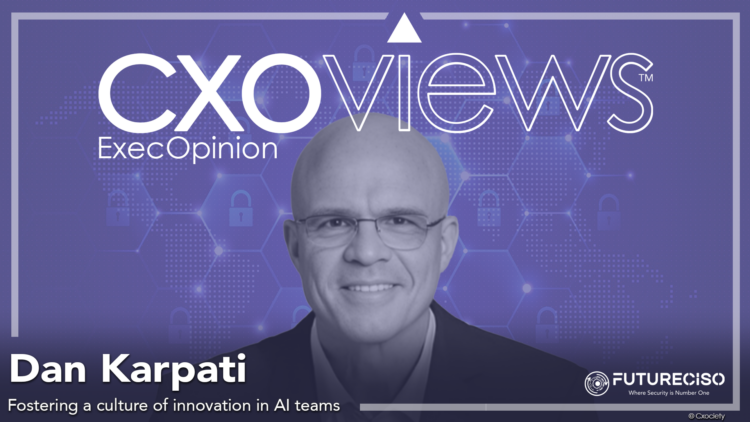The importance of innovation in today’s rapidly evolving tech landscape cannot be overstated enough.
An article from Harvard Business School defines innovation as both “novel and useful”, differentiating it from mere creativity.
“For an idea to be innovative, it must also be useful. Creative ideas don't always lead to innovations because they don't necessarily produce viable solutions to problems,” it added.

In an interview with FutureCIO, Dan Karpati, the vice president of AI Technologies at Check Point Software, reflected on his journey in building an innovation-driven AI team.
From the ground up
Six years ago, Karpati joined Check Point Software as its CTO and chief technologist, where he played a key role in building the company's AI team from the ground up. Now serving as vice president of AI Technologies, he has helped make AI a central driver of Check Point's cybersecurity innovations. His mission has been to develop AI-powered solutions and cultivate a culture where AI is embraced across the organisation.
He recalled that AI was already present at Check Point before he arrived, with a key milestone in 2015 when the company acquired Lacoon, a mobile security provider. That acquisition marked the beginning of AI's integration into cybersecurity, initially in mobile security and later expanding to file security, URL filtering, and cloud-based AI. The company gradually introduced machine learning (ML) solutions, but AI expertise was fragmented, with only a handful of data scientists across various departments.
One of the biggest challenges he observed was that AI projects often remained academic, focusing more on research than on real-world applications. Many AI researchers, he noted, prioritised publishing papers and attending conferences over developing commercial products.
His goal was to change that mindset.
"I took a department that was less optimised to produce meaningful stuff into a product and made it an efficient machine that creates value," he said.
He added that his most significant contribution was building Check Point's AI department into what it is today.
When he started, AI development was in its early stages, with just 18 data scientists working on algorithms. Over time, these efforts evolved into creating AI libraries and later into adopting open platforms like Hugging Face and GitHub. Today, with the rise of generative AI, AI is no longer just a tool for specialists but is becoming more accessible across the organisation.
For Karpati, scaling AI across the company was a priority. "From my side and management, the expectations were: How do you scale AI across the org? It's not that only your people will know when AI will do AI... the challenge is how you scale AI and make it accessible across the board," he said.
The launch of AI Co-Pilot was a milestone in this journey, marking the company's first AI-driven production service. This was a turning point in making AI available beyond specialised teams and integrating it across various functions.
"Now we are going to AI agents. They will be able to incorporate the AI agent framework and think about how they can tailor it for their own sake, own product," he added.
A culture of innovation
Reflecting on what drives innovation within his team, Karpati emphasised that innovation must come naturally rather than be forced.
"If you need to drive them, it is a failure," he said, explaining that true innovation happens when individuals are motivated by curiosity and problem-solving.
"I need to teach the team to understand that this is innovation. Innovation is technology meets real-world problems," he added.
Innovation is technology meets real-world problems. Dan Karpati
He believes that fostering innovation requires a human approach. "As opposed to AI, you need to be human. It means that you need to be highly approachable, to come up with passion and lead with passion," he said.
It is essential to create a space where team members feel free to express their ideas and take risks.
"People can say whatever they think. They can come up with new ideas. They have the freedom to decide if something is interesting and if they want to investigate it," he explained.
To reinforce this sense of openness, Karpati created a chat group called "Garage," inspired by the humble beginnings of tech leaders like Bill Gates and Gil Schwed.
The 'Garage' chat group is a platform where team members can freely share their ideas, discuss ongoing projects, and even post personal updates, fostering a sense of camaraderie and pride in their work.
"We are in the garage. It means it must be informal," he said.
He noted that psychological safety, the freedom to experiment without fear of harsh judgment, is critical to fostering innovation.
It's okay to fail. There's no such thing as failure. You try things, and then you move on to other things. There's no judgment. Dan Karpati
"There's no harsh judgment about what they do. It's okay to fail. There's no such thing as failure. You try things, and then you move on to other things. There's no judgment," he said.
He believes this mindset empowers his team to take on new challenges and step outside their comfort zones.
"These are all small elements that eventually build pride, fostering the notion that once you cross the corridor, you have crossed it and feel a sense of self-fulfilment. Once I manage people, I try to get to the point where I want my team to go across the corridor, and they feel self-fulfilment because people are looking up to them," he said.
Keeping up with advancements
Karpati acknowledged that one of the biggest challenges in AI development is keeping pace with rapid advancements.
"You come in the morning and find out that whatever you did yesterday is irrelevant at night," he said.
Another major challenge is building trust in AI, particularly convincing executives and customers that AI is not just a theoretical concept but a tool that solves real business problems.
"How do you take customers and executives with you on this journey to build confidence in AI so that it can solve real problems? It can be monetised. This is a real challenge, how you build confidence in what you build," he said.
Overcoming fear and scepticism
For leaders hesitant about AI and innovation, Karpati believes that transformation occurs when people fall in love with the technology.
He argues that organisations should find ways to make AI engaging and meaningful for employees but that enthusiasm cannot be forced.
You want your kids to have a better future. Now, learn the technology, not for yourself. Learn for your kid. Dan Karpati
"Another option is to make them understand that they cannot stop history. And they better think about themselves and their kids' future. You want your kids to have a better future. Now, learn the technology, not for yourself. Learn for your kid," he said.
He observed that many people fear AI simply because they don't understand it.
For companies, embracing AI should not be seen as an experiment but as the future of business and industry.
"I think AI is fascinating. I'm not objective, but I believe most humans are experimenting with AI. This is beneficial because generative AI, unlike previous AI, is based on human data. This is the novelty here. It's all human data being trained now. And eventually, you can do everything with that," he said.
He believes education is key to overcoming the fear and skepticism surrounding AI. Many people still do not fully understand its risks or potential.
While AI holds immense power, he warns that it can also be dangerous if improperly handled.
Looking ahead, Karpati sees AI in cybersecurity evolving toward self-operating systems, collaborative intelligence, and proactive network defence. He remains optimistic that, with a strong culture of innovation, the future of AI will continue to push boundaries and drive meaningful change.




